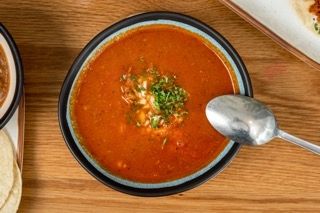Why diners crave freshly made guacamole from start to finish
Wiki Article
Is Mexican Food Healthy? Unpacking the Nutritional Conveniences of Standard Ingredients
The inquiry of whether Mexican food is healthy welcomes an exploration of its traditional active ingredients. Beans and corn function as fundamental staples, rich in healthy protein and fiber. Avocados offer helpful fats, while different herbs and seasonings add taste and health advantages - churros. With each other, these elements create a tapestry of nourishment. However, the healthfulness of Mexican cuisine often relies on preparation methods and part dimensions. What duty do these factors play in identifying its total nutritional value?The Power of Beans: Healthy Protein and Fiber-Rich Staples
Often neglected, beans serve as a cornerstone of Mexican food, providing a riches of nutritional benefits. Rich in healthy protein, they are an outstanding plant-based choice for those seeking to meet their nutritional protein requires. This high healthy protein material supports muscle mass repair work and growth, making beans vital for both vegetarians and meat-eaters alike. In addition, beans are a phenomenal source of dietary fiber, which assists in digestion and promotes a sensation of fullness, possibly aiding with weight monitoring.The variety of beans utilized in Mexican recipes, such as black beans, pinto beans, and kidney beans, adds to a varied flavor account and can enhance meals nutritionally. Beans are reduced in fat and include necessary vitamins and minerals, including iron, folate, and magnesium. Together, these qualities make beans an essential active ingredient, supplying both sustenance and nutrition in standard Mexican price.

Corn: a Versatile Grain With Nutritional Perks
Corn attracts attention as a flexible grain essential to Mexican cuisine, celebrated not just for its cooking applications yet additionally for its excellent nutritional account. As a primary ingredient in dishes like tortillas, tamales, and pozole, corn gives crucial nutrients that add to a well balanced diet regimen. Rich in carbs, it acts as a significant power resource, while also being reduced in fat, making it a beneficial option for different dietary needs.Moreover, corn is a good resource of nutritional fiber, which helps in food digestion and promotes satiety. It includes considerable quantities of vitamins such as B-complex vitamins, which are essential for basal metabolism. The presence of antioxidants, specifically carotenoids, adds to general wellness by lowering oxidative stress. Furthermore, corn is gluten-free, satisfying those with gluten level of sensitivities. Overall, the nutritional benefits of corn underscore its significance in conventional Mexican food and its duty in a healthy diet regimen.
Avocados: Healthy And Balanced Fats and Nutrients in Every Bite
Avocados play a substantial role in Mexican food, matching meals with their creamy appearance and abundant taste. Past their cooking charm, avocados are celebrated for their excellent nutritional account. They are an abundant resource of healthy and balanced monounsaturated fats, which can help lower bad cholesterol levels and support heart health. In addition, avocados are loaded with necessary nutrients, including potassium, vitamin E, and B vitamins, adding to general wellness.The high fiber web content in avocados aids food digestion and promotes satiety, making them a valuable addition to any type of meal. Their distinct nutrient composition can also support skin health and wellness and give anti-inflammatory advantages. Including avocados into typical Mexican meals or appreciating them as a standalone snack can improve both taste and nutrition, showing why they are a precious staple in Mexican food. On the whole, avocados supply a tasty way to enjoy healthy and balanced fats and essential nutrients in every bite.

Spices and Natural Herbs: Flavorful Health Boosters
While delighting in the rich flavors of Mexican cuisine, one can not forget the vital function that spices and natural herbs play in enhancing both preference and health and wellness. Ingredients such as cilantro, chili, and oregano peppers not only contribute to the dynamic flavor account however also give considerable health advantages. read this article For example, cilantro is recognized for its cleansing residential or commercial properties, helping to remove heavy steels from the body, while oregano is packed with anti-oxidants and possesses anti-inflammatory results.Chili peppers, a staple in several Mexican dishes, contain capsaicin, which has been linked to enhanced metabolism and discomfort alleviation. Furthermore, flavors like cumin and coriander assistance food digestion and might aid in blood sugar policy. Including these flavorful health boosters into dishes not just enhances the cooking experience but additionally advertises overall wellness, making Mexican cuisine not simply tasty, yet additionally nutritionally beneficial.
Conventional Food Preparation Methods: Enhancing Nutrition and Taste
Traditional food preparation methods in Mexican food play an essential duty in enhancing both nourishment and flavor, as they often focus on time-honored techniques and fresh components. Techniques such as nixtamalization, where corn is soaked and cooked in an alkaline service, not just improve the nutrient account of tortillas but likewise improve their digestibility - best mexican westchester NY. Additionally, the use of slow cooking techniques, like cooking or braising, permits flavors to meld beautifully while retaining the honesty of the ingredientsOften Asked Inquiries
Are Mexican Food Portions Usually Larger Than Other Foods?
Mexican food sections are frequently larger than those of lots of other cuisines. This characteristic reflects traditional dining techniques, highlighting public sharing and hearty dishes, which can lead to a more substantial serving dimension in general.
Exactly how Does the Prep Work Technique Affect Healthfulness of Mexican Food?
Prep work methods greatly influence the healthiness of Mexican food. Strategies such as grilling or steaming click here to find out more protect nutrients, while frying can raise undesirable fat content. Selections of ingredients and cooking designs inevitably establish total nutritional worth.Can Mexican Food Be Tailored for Details Nutritional Constraints?
Mexican food can indeed be tailored for details nutritional constraints. Replacements, such as making use of corn tortillas for gluten-free diets or integrating more veggies, make it possible for individuals to enjoy standard tastes while accommodating numerous dietary demands.What Prevail Misconceptions Concerning Mexican Food and Wellness?
Common mistaken beliefs about Mexican food consist of the idea that it is naturally unhealthy, overly zesty, and entirely focused on fats. Actually, typical recipes frequently feature nourishing ingredients and can be customized to various nutritional demands.Are There Much Healthier Options at Mexican Restaurants?
Much healthier options at Mexican dining establishments frequently consist of barbequed meats, beans, and fresh veggies. Picking recipes that stress entire active ingredients and staying clear of investigate this site hefty sauces can lead to a more nutritious eating experience, promoting total health.The selection of beans used in Mexican dishes, such as black beans, pinto beans, and kidney beans, adds to a varied taste profile and can boost dishes nutritionally. Avocados play a substantial function in Mexican cuisine, complementing recipes with their creamy texture and abundant flavor. Incorporating avocados into standard Mexican meals or appreciating them as a standalone treat can improve both taste and nourishment, showing why they are a precious staple in Mexican food. While delighting in the rich flavors of Mexican cuisine, one can not ignore the necessary duty that spices and natural herbs play in enhancing both preference and wellness. Traditional cooking approaches in Mexican food play a vital role in improving both nourishment and flavor, as they often prioritize fresh components and time-honored methods.
Report this wiki page